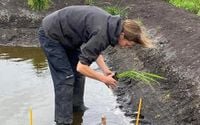In the heart of the English countryside, a quiet agricultural revolution is taking root. On a modest farm just north of Ely in Cambridgeshire, the UK’s very first rice crop is now ripe for picking—a milestone that, until recently, would have sounded like a punchline to most British farmers. But after the hottest summer since records began in 1884, what once seemed impossible is now a reality, and the implications could reach far beyond the dinner table.
“When I tell people what I’m doing here, they think I’m joking,” admits Nadine Mitschunas, an ecologist from the UK Centre for Ecology and Hydrology (UKCEH) and the driving force behind this ambitious project. Mitschunas, along with local farmers Craig and Sarah Taylor, has overseen the planting of nine varieties of rice in four small, purpose-built paddy fields. These fields, carved out of the rich, peaty soils of the Fens, have basked in an unprecedentedly hot and sunny summer—conditions that have given the experimental rice plants a fighting chance.
“Nobody has tried this before, but with climate change, we have crops that, 10 years ago, we wouldn’t have thought would be viable,” Mitschunas told BBC News. “In 10 years’ time, rice could be a completely perfect crop for us.” The varieties under trial hail from as far afield as Brazil, Colombia, Italy, and the Philippines, including rice types familiar to fans of risotto, basmati, and sushi.
The project, as reported by BBC and The Telegraph, is about more than just growing rice for British plates. It’s a bold attempt to answer some of the most pressing questions facing the UK’s food system: How can the country produce enough food in a warming world, and how can it do so without further damaging the environment?
The Fens, where the trial is underway, are among Britain’s most productive agricultural regions. A third of the nation’s vegetables are grown here, generating around £1.2 billion annually. But this bounty comes at a cost. The land sits atop peat soils that were once underwater, only to be drained in the 17th century to make way for farming. As the peat dries out, it releases carbon dioxide into the atmosphere, contributing to greenhouse gas emissions—peat soils account for an estimated 3% of the UK’s total emissions, according to BBC News.
Flooding fields to grow rice, as the project does, could help lock greenhouse gases in the wet soil, potentially reversing some of the damage caused by centuries of drainage. “Flooding the peat soil could reverse carbon dioxide emissions caused by soil drying,” The Telegraph explains. This approach, known as peatland re-wetting, is being closely watched by both environmentalists and government officials. The UK Department for Environment, Food and Rural Affairs has already visited the site, signaling official interest in the project’s findings.
Of course, growing rice in the UK isn’t without its risks or skeptics. Professor Richard Pywell, who leads the project for UKCEH, cautions that Britain is currently “right at the edge of rice’s range,” and that for now, commercial planting would be a gamble. “It would be a risky crop for farmers to plant commercially,” he told BBC News, “but Britain’s climate is changing quickly. If annual average temperatures warm by between 2 and 4°C compared to pre-industrial levels—a scenario many scientists say is likely—rice could be grown widely in the UK.”
Not everyone is convinced that introducing rice to the British landscape is a good idea. “Farmers are looking at almost everything at the moment. But what are you going to do when 10,000 geese land on those paddy fields?” asked Graham Denny, an East Anglian farmer and conservationist, in The Telegraph. “All these things that’s great in a photoshoot, but are they thought through?” he added, reflecting broader concerns about the impact of non-native crops and the practicalities of large-scale rice farming in the UK.
Yet, there are potential upsides beyond emissions. Conservationists, like curlew expert Mary Colwell, point out that rice fields could provide much-needed wetland habitat for birds. The curlew, once common across the UK but now in steep decline, has been observed using rice paddies in the Mediterranean as foraging and stopover sites during migration. With Britain having lost about 90% of its wetland habitats in the past century, new paddy fields could offer unexpected ecological benefits.
For the Taylors, whose family has farmed the Fens for over five centuries, the project is as much about legacy as it is about innovation. “All my ancestors were Fenmen. I love this place, we’ve been here for 500 plus years,” Craig Taylor told BBC News. Surrounded by traditional crops like potatoes, onions, and beets, the rice paddies stand as a symbol of both continuity and change. “We don’t want people thinking we’re the ‘crazy rice farmers’—this is about rethinking the whole system and making it work for everyone,” Craig said. Sarah Taylor echoed his sentiments, adding, “Our legacy for our children and hopefully their children is really important to us and I want them to know that we at least try to make a difference.”
The experiment isn’t limited to rice. Other crops, such as lettuce and hybrid willow, are also being trialed for their ability to thrive in waterlogged conditions. Early results suggest that while rice cultivation does produce methane—a potent greenhouse gas—the overall emissions may still be lower than the carbon dioxide released from drying peat. “Initial results from the trials so far suggest the rice crop is not producing more emissions than it helps lock away,” BBC News reports.
Despite the excitement, it will be some years before British-grown rice appears on supermarket shelves. “It may be a decade before UK-grown rice is commercially available,” as both BBC News and The Telegraph note. But the project’s broader ambitions—to safeguard food security, support farmer livelihoods, and help curb climate change—are already sparking conversation across the agricultural and environmental sectors.
“We see that the future isn’t stable. We want to be able to write our own destiny and not have it decided for us,” said Sarah Taylor, capturing the spirit of a new generation of farmers facing an uncertain climate. As the UK stands at this agricultural crossroads, the humble rice plant may just point the way toward a more resilient and sustainable future.




